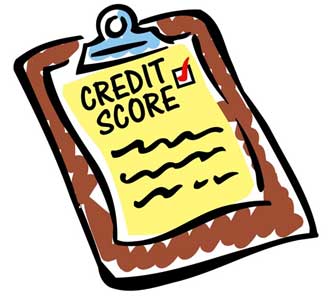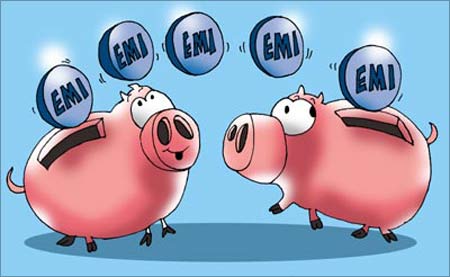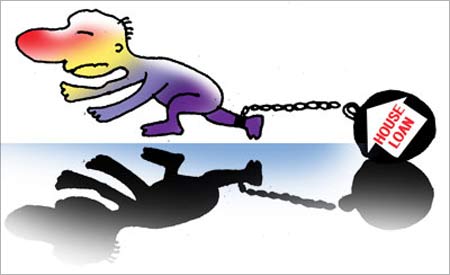Photographs: Uttam Ghosh/Rediff.com Naveen Kumar, Outlook Money
Have you ever wondered why your loan application was rejected or why you got a lower amount of loan than what you had applied for?
Perhaps you have wondered what goes into deciding your loan application. While there are many factors that are taken into account during the appraisal process of your loan application, one factor that is gaining greater prominence by the day is your credit history.
Your credit history makes the first impression about you to a prospective lender. Earlier it was available only to lenders, but from 2009, individuals, too, can get a copy of their credit report, with their credit score.
Credit Information Bureau (India) (Cibil), in association with TransUnion, has launched the Cibil TransUnion credit score for consumers as well.
So now you too can get your credit score along with a copy of your credit report and paying the necessary fee and doing the related paperwork.
. . .
Credit score: Why it matters, how to get it
This score maps your credit behaviour in numbers. Arun Thukral, managing director, Cibil, says: "It was tested extensively with the banks and results were extremely positive. Banks have integrated it into their risk management and credit policy, as it plays a very critical role in their decision making cycle."
Since the manner in which the lenders see you will significantly depend upon your credit history and credit score, we tell you how to make the best of it.
What is it? Credit score offered by Cibil is a three digit numeric summary ranging between 300 and 900.
The score is derived from your credit history, that is, basically from your repayment track of previous or existing credit accounts (loans and credit cards) and inquiries for any line of credit.
The rule is: the closer your score is to 900 the better it is and the higher the probability of your credit application being looked at positively by the credit grantor.
. . .
Credit score: Why it matters, how to get it
Phil Nolan, managing director, Experian Credit Information Company of India, says: "The score is a summary of the overall ranking of risk for that consumer. It is important for the consumer to understand what affects his ability to obtain credit."
The score is based on answers to questions such as: how much credit you are using (the lower the better); how many accounts are past due -- by how many days and by how much (zero is best); whether you have applied for additional credit lines (restrained and need-based are better); how old are your lines of credit (the older the better); what type of credit you have (a good mix is better than just credit cards).
Thukral says: "We had actually launched it in 2007 for banks, but it needed time, because you need technology, integration and small alterations in their system too, as they had to integrate a new variable."
Other credit bureaus like Equifax Credit Information Service, Experian Credit Information Company of India and High Mark Credit Information Services are also lining up to launch their credit score.
What it means for you. A good credit score ensures faster processing of your loan application with better terms and conditions.
. . .
Credit score: Why it matters, how to get it
Thukral says: "It conveys to the credit granter the probability of a default of that consumer in the next 12 months. So, if your score is very high, the risk involved with that transaction is very limited, and lenders would be more willing to give you a loan or line of credit. The more recently you have been disciplined with your repayment, the better it would reflect on credit scores."
Even in the event of a bad score, its prior knowledge can help you set things back on track.
Be extra cautious with secured loans. Secured loans, like home and auto loans are backed by security, making them less risky.
They are generally of higher value than unsecured credit, like personal loans and credit cards. So, any default on a secured loan is taken very seriously.
Command your future. Credit score-based loan appraisal systems are well established in Western economies and India is following the suit.
A good credit score can increase your bargaining power with lenders and will enable to you to negotiate favourable terms and conditions with them.
. . .
Credit score: Why it matters, how to get it
Globally, it is a risk-based decision and your interest paid varies favourably if your score and credit history are good.
Thukral says: "Your processing charges in home loans would be waived off if your score is good as banks would want good customers in their portfolio as the risk is minimal and their NPA is not hit. This is a beginning and it will evolve in India also, as it has evolved over the years in other parts of the world."
However, Samir Bhatia, managing director and CEO, Equifax Credit Information Service differs: "I don't think we have come to an age where banks will give rate of interest based on scores. It will happen in the future but, right now, it's too early."
You can purchase your Cibil TransUnion Score along with your Cibil Credit Information Report (CIR) for Rs 450. You can make the payment by following an online payment procedure on the Cibil website (www.cibil.com) or by sending a demand draft at the address mentioned on the Cibil website.
You will have to submit your identity proof and address proof with the application form. CIBIL generally sends your score and CIR within 2-3 weeks after receipt of payment and documents.
. . .
Credit score: Why it matters, how to get it
Beyond the score
Your credit score is an important factor in assessing your loan application. However, it's not the only one. Other factors like your job or business stability, residence stability, debt to income ratio and so on are also important.
The Cibil TransUnion credit score ranges between 300 and 900. A score closer to 900 is good while a score closer to 300 is poor.
The score is derived from your credit history, basically from your repayment record of previous or existing credit accounts (loans and credit cards) and enquiries for any fresh line of credit.
. . .
Credit score: Why it matters, how to get it
Good Score: How you benefit
Dependence on credit score will increase in India, like it has in other countries.
Faster application process: With the comfort of a good score, banks will do away with extra scrutiny.
Lower rate of interest: As a high score depicts lower risk of default, a bank will be able to give you the best possible rate of interest.
Better limits: A good score will ensure that you will get higher loan amounts and credit limits.
Waiver of processing fee: To attract good customers to have healthy loan portfolios and lower NPA, banks can offer discount or waiver on processing fee.
Favourable pre-penalty clause: You can bargain for some terms and conditions, like pre-payment penalty.
. . .
Credit score: Why it matters, how to get it
Bad score: Not the end of the road
Your recent credit discipline can help you improve your score:
Check your credit report: Check the report details for accuracy and to find if there is any incorrect default shown. If there is, talk to the lender and get it rectified.
Restructure: If you are facing difficulty in servicing your current EMI, talk to the lender and check the possibility of reducing the EMI.
Consolidate credit accounts: A high number of credit lines, such as credit cards, might have a negative impact. Bring them to a minimum level.
Be disciplined: Repayment discipline is an absolute must for achieving a good score.
Avoid using higher limits: Regularly using higher limits of the credit line reflects badly on your financial prudence.










article